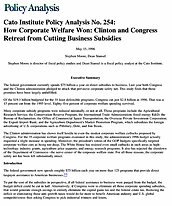The federal government currently spends $75 billion a year on direct subsidies to business. Last year both Congress and the Clinton administration pledged to attack that pervasive corporate safety net. This study finds that those promises have been largely unfulfilled.
Of the $19.5 billion budgeted for the 35 least defensible programs, Congress cut just $2.8 billion in 1996. That was a 15 percent cut from the 1995 level. Eighty-five percent of corporate welfare spending survived.
Many corporate subsidy programs were reduced minimally, or not at all. Those programs include the Agricultural Research Service; the Conservation Reserve Program; the International Trade Administration; fossil energy R&D; the Bureau of Reclamation; the Office of Commercial Space Transportation; the Overseas Private Investment Corporation; the Export-Import Bank; and the Agriculture Department’s Market Promotion Program, which subsidizes the foreign advertising of U.S. corporations such as Pillsbury, Dole, and Jim Beam.
The Clinton administration has shown itself hostile to even the modest corporate welfare cutbacks proposed by Congress. For the 35 corporate welfare programs examined in this study, the administration’s 1996 budget actually requested a slight increase in spending. Moreover, the president’s vetoes of the GOP budgets specifically targeted corporate welfare cuts as being too deep. The White House has resisted even small cutbacks in such areas as high-technology industry grants, agriculture price supports, and energy research programs. It also has rejected the shutdown of the Department of Commerce–the nerve center of the corporate welfare state. For all those reasons, the corporate safety net has been left substantially intact.
About the Authors

This work is licensed under a Creative Commons Attribution-NonCommercial-ShareAlike 4.0 International License.
